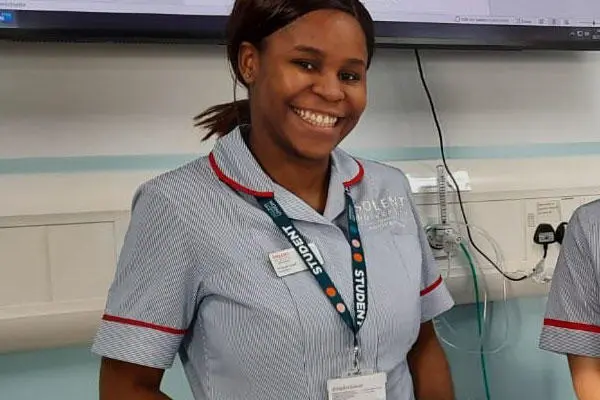
BSc (Hons) Adult Nursing Practice
Change lives and become a confident and caring nurse with our NMC-accredited Adult Nursing Practice degree. Working with partner NHS Trusts, gain the skills for a fulfilling and successful career.
I am currently a Band 5 nurse in the emergency department (ED). My role is crucial in providing immediate and life-saving care to patients in critical conditions. I triage and assess patients, prioritise their care, and collaborate with a multidisciplinary team to manage emergencies effectively.
I perform clinical procedures, such as venipuncture, IV cannulation, wound care, and medication administration, which is all essential in ensuring prompt treatment delivery. I closely monitor patients' vital signs and observations, swiftly detect any changes in their conditions, and take immediate action when necessary.
Effective communication is a vital aspect of my role, as I interact with patients and their families, explaining diagnoses, treatment plans, and providing reassurance during stressful situations. Additionally, accurate documentation of patient information, assessments, treatments, and interventions ensures continuity of care and supports legal and audit requirements.
The beautiful thing about the NHS is it offers so many different options. One of the aspects I enjoy most about being a nurse in the emergency department is the fast-paced and dynamic nature of the work. Every day brings new challenges and opportunities to make a significant impact on patients' lives.
One of the aspects I enjoy most about being a nurse in the emergency department is the fast-paced and dynamic nature of the work. Every day brings new challenges and opportunities to make a significant impact on patients' lives. The adrenaline rush that comes with handling medical emergencies and providing immediate care is truly exhilarating. It keeps me on my toes and allows me to continually sharpen my clinical skills and critical thinking abilities.
Additionally, the collaborative environment in the ED is incredibly rewarding. Working closely with a diverse team of healthcare professionals, including doctors, paramedics, and technicians, fosters a strong sense of camaraderie and mutual support. We collaborate seamlessly, pooling our expertise to ensure the best possible outcomes for our patients. The teamwork and shared commitment to providing exceptional care create a positive and fulfilling work environment.
As a nurse in the emergency department, I have faced various challenges that have contributed to my professional growth. One of the most significant challenges I have encountered is the high-pressure environment and the constant influx of critically ill patients. Handling emergencies and making critical decisions in fast-paced situations can be demanding, requiring quick thinking and the ability to remain calm under pressure. However, I have learned to adapt and develop effective strategies to prioritise care and provide timely interventions.
Additionally, the diverse and complex nature of patients and their conditions can pose challenges in providing comprehensive and individualized care. Balancing multiple patient needs, coordinating with various healthcare professionals, and ensuring effective communication can be demanding.
Advice that I would give to anyone who is a student now especially, is to try and enjoy it, ask as many questions as you can, and gain as much knowledge as possible. The NHS is full of so many smart people that specialise in many subjects and often if they are passionate about the area they are in they can talk for hours on end, so definitely gain as much knowledge as you can on everything relevant to your job.
The beautiful thing about the NHS is it offers so many different options. If you want to be a ward manager or a matron, you can; or if you want to be a Band 5 nurse forever, you can. For me, I would like to increase my clinical knowledge and progress up what I call the clinical ladder into a role such as an ACP or ANP, maybe even working in an outreach team or as even one of the ACP in ED - either way, I aim to gain as much clinical knowledge as possible and work in high acuity settings for my career.
